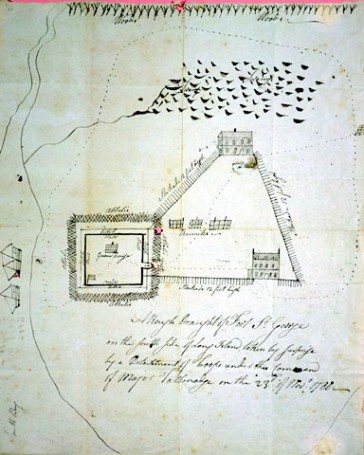
The Ketcham Inn and the Curious Case of the Culper Connection (Part 4)
June 13, 2015
Anna Smith Strong's cousin, William Smith, was a member of the Provincial Congress and the Lord of St. George's Manor, an old family estate on Smith's Point, on the South Shore of Long Island. At the time of the British occupation, Smith and his family were driven from their home and forced to flee to upstate New York. Mrs. Smith (Ruth Woodhull), a sister to the martyred brigadier general, Nathaniel Woodhull, stayed behind, taking up residence in a nearby cottage. Located in the hamlet of Mastic, in the town of Brookhaven, the manor house was just seven miles from Benjamin Havens' inn.
In the fall of 1780 a party of Loyalist refugees from Rhode Island appropriated the abandoned manor. The purpose of their occupation was to protect Tory woodsmen who were working in the surrounding woodlands owned by the Smith family, cutting immense quantities of timber for the British markets in New York City. It was also an ideal position from which to guard the eastern end of the Great South Bay and an inlet through the barrier islands that existed nearby.
The refugees strengthened the compound with the addition of a triangular 12 foot picket stockade enclosure of several acres that included the manor house, a fort, ditch and other structures. The entire complex was completed in just a few days.
Benjamin Tallmadge soon became aware of the affront to the manor and notified his commander. George Washington initially resisted action but was persuaded when he learned that eight miles away in Coram the British had stored a large quantity of forage near a tavern kept by Elijah Davis, one of the old Committee of Safety's 26.
On the 6th of November Caleb Brewster sent a report to Tallmadge from Fairfield Conn: Dear Sir, I proceeded from this place on the 3rd and returned this afternoon, the time appointed to go over again is on the 10th instant. There is three Hundred Tons of Hay at Coram collected from South Hold, Southampton and East Hampton and taken at Coram, which is expected soon to be carried away by the enemy, at New York. Should be glad if you would inform me as quick as possible whether you would have me go and destroy it or not. I can do it without interfering with my other business. Tis reported in New York that the Cork Fleet is taken, and generally believed there. Am sir in Haste Every Red Mark & ends high Your most obedient Humble Servant Caleb Brewster
Tallmadge quickly notified Washington who responded: Headquarters November 11, Sir:—I have received your letter of the 7th instant. The destruction of the forage collected for the use of the British army at Coram upon Long Island, is of so much consequence, that I should advise the attempt to be made, I have written to Col. Sheldon to furnish you a detachment of dismounted dragoons, and will commit the execution to you. If the party at Smith's house can be attempted without frustrating the other design, or running too great a hazard, I have no objection. But you must remember that this is only a secondary object, and, in all cases, you will take the most prudent means to secure a retreat. Confiding entirely in your prudence as well as enterprise, and wishing you success, I am yours, &c., G. WASHINGTON.
On the 13th Caleb reports: Dear Sir. Returned this evening from the Island. I left on Saturday. Culper was not at home and had to weight till this morning for him - has not made the appointment with me. Forrage is at Coram yet in stack where tavern is kept. There remains about forty Ruffigeus yet at Mastick on Mr. Smith's place. They have no cannon, nothing but muskets...I am Dear Sir, your most obedient humble servant, C. Brewster.
In the December 2nd issue of the Royal Gazette, James Rivington described the battle with his signature Tory spin: 80 Rebels headed by Maj. Talmadge, assisted by Heathcot Muirson, Benajah Strong, Thos. Jackson, Caleb Brewster, officers belonging to the same party, formerly all of L. I., came across in 8 whale-boats and landed between Wading R. and Old Man's, (supposed to have been concealed 2 or three days by their old friends on the Island). On Thursday morning, 23d Nov., about 50 marched across the Island (the remainder being left to guard the boats) just after daylight, arrived at Smith's Point, St. George's Manor, where they surprised a respectable body of loyal refugees from R. I. and the vicinity, who were establishing a post to get a present subsistence for themselves and their families. The sentry on observing them, fired, which they returned and mortally wounded him, and rushed into a house. Mr. Isaac Hart, of N. Port, was inhumanly fired on, wounded and bayoneted in 15 different parts of his body, and beat with their muskets in a shocking manner in the very act of imploring quarter, and died of his wounds a few hours after. Four more refugees were wounded also, but are in fair way of recovery. A poor woman was also fired on at another house and barbarously wounded through both breasts, of which wound she now lingers. The Rebels carried off about 40 prisoners; on their return at Coram, they burnt a magazine of hay, about 100 tons, and same day embarked for the Con't shore.
A portion of Tallmadge's report states: This service was executed entirely without the loss of one man, and only one was badly wounded and him we brought off. Thus in 21 hours we marched near 40 miles, took the Fort, burnt the magazines, &c. The enemy's loss was 7 killed and wounded, most of the latter mortally. We took one Lt. Col. Commandant, one Capt., one Lt., one Surgeon, and 50 rank and file, with a host of others in the garrison whom we left behind; also one garrison standard. Mr. Muirson was a volunteer, and deserves commendation. He advanced with Lt. Jackson over the abattis and wall into the Post.
Congress passed a resolve complimenting the commander and troops, saying that the expedition was planned and conducted with wisdom and great gallantry by Major Tallmadge, and executed with intrepidity and complete success by the officers and soldiers under his command. George Washington sent the following letter to Tallmadge:
Morristown, Nov. 28, 1780. Dear Sir:—I have received with much pleasure the report of your successful enterprise upon Fort George, and the vess with stores in the bay, and was particularly well pleased with the destruction of the hay at Coram, which must, I conceive, be severely felt by the enemy at this time. I beg you to accept my thanks for your judicious planning and spirited execution of this business, and that you will offer them to the officers and men who shared the honors of the enterprise with you. The gallant behavior of Mr. Muirson gives him a fair claim to an appointment in the second regiment of dragoons, when there is a vacancy. And I have no doubt of his meeting with it accordingly, if you will make known his merit, with these sentiments in his favor. You have my free consent to reward your gallant party, with the little booty they were able to bring from the enemy's works. Your's, &c., G. WASHINGTON.
Tallmadge recounts that he came upon Mrs. Smith while on his march to Fort St. George. When he informed her that he might be compelled to burn her home (the manor house) she said at once, "Destroy it and welcome, if you can drive out those Tories." He credits William Booth, the overseer for the manor who lived nearby, with supplying information and a map vital to the success of the expedition. It was also Booth who led Tallmadge to the occupied structure.
But who else was involved? Surely there were other links in the chain; other operatives in the network - collecting, supplying or passing information. Just what role did Benjamin Havens play? His tavern was only seven miles away. He must have had a particularly powerful interest. He was clearly prone to annoying the British. He'd always managed to be in the thick of things and was certainly known to associate intimately and enthusiastically with those spies and "rebels" in question - some even in his own tavern.
Furthermore, he had the opportunity, as well as the location. Much like Robert Townsend, with his coffee shops in the city, a tavern owner at his bar in the British infested countryside, hears things, if he is inclined to listen. The tavern itself is a natural and accepted meeting place. One can go there for a pint of ale without drawing suspicion. A willing barkeep can act as a liaison for the furtive passing of information or the exchange of a confidence without detection. He can accept a coded note or a simply drawn map and hold it for safekeeping until an appropriate agent can come from elsewhere to retrieve it.
Was Benjamin Havens, that "most pernicious caitiff," one of those anonymous unsung heroes of the American Revolution? We do know that the British, from time to time, did get to old Ben. Four months after the Battle of Fort St. George, they finally did some damage at the inn. On the 7th of June, 1781, Benjamin and his son, Selah Strong Havens, a former captain in the militia, petitioned the governor of New York State, George Clinton, after an opportunistic ship's captain, Zebulon Stow, raided their place. Stow had a controversial commission from the govenor of Connecticut to go to Long Island and seize "British" goods. While this was a common practice at the time, there is no doubt that Havens, even by his own report, was singled out:
To his Excellency Governor Clinton,
The humble petition of your memorialists sheweth that since the British Troops have taken possession of this Island, your memorialists have at sundry times been plundered and personally abused for their attachment to the Cause of Liberty and Humanity to American prisoners - and, furthermore, that they were sometime in the month of April plundered by A Certain Capt. Stow, of N. London to the amount of twelve hundred pounds. A List of which Goods your memoralists are ready to produce. The humble petition of your memorialists is, therefore, to beg (as they belong to A part of the State that your Excellency at present governs) he would be pleased to order said Goods to be restored - and they always shall think themselves to your Excellency in Duty bound.
Benj'm Havens,
Selah Havens.
(comments = 0)
leave a comment

fineartistmade blog
A journal about home design, gardening, art & all things Maine. Read more...
- June 2025
- December 2022
- November 2022
- October 2022
- November 2021
- May 2020
- October 2019
- August 2019
- July 2019
- September 2018
- April 2018
- December 2017
- August 2017
- June 2017
- May 2017
- December 2016
- August 2016
- July 2016
- April 2016
- November 2015
- June 2015
- May 2015
- March 2015
- October 2014
- March 2014
- February 2014
- January 2014
- December 2013
- November 2013
- July 2013
- May 2013
- April 2013
- March 2013
- January 2013
- December 2012
- November 2012
- August 2012
- June 2012
- April 2012
- March 2012
- February 2012
- January 2012
- December 2011
- October 2011
- August 2011
- July 2011
- June 2011
- May 2011
- April 2011
- March 2011
- February 2011
- January 2011
- December 2010
- November 2010
- October 2010
- September 2010
- August 2010
- July 2010
- June 2010
- May 2010
- My Scandinavian Home
- Daytonian in Manhattan
- {frolic!}
- I Married An Irish Farmer
- Smitten Kitchen
- The Curated House
- even*cleveland
- Mary Swenson | a scrapbook
- Ill Seen, Ill Said
- Gross & Daley Photography
- Remodelista
- Abby Goes Design Scouting
- Mint
- the marion house book
- 3191 Miles Apart
- Svatava
- Katy Elliott
- Poppytalk
- Kiosk
- decor8
- KBCULTURE
- Lari Washburn






